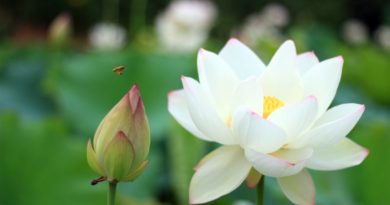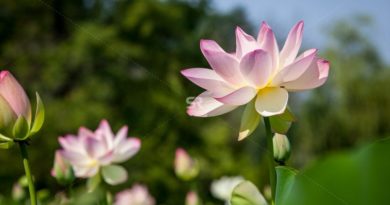Small Pali-english Glossary Of Buddhist Terms
Small Pali-English Glossary of Buddhist Terms – Bhikkhu Bodhi
The glossary below was prepared by Venerable Bhikkhu Bodhi to accompany his series of audio lectures “The Buddha’s Teaching as it is” .
Special Pāḷi characters:
long vowels : Ā ā Ī ī Ū ū
cerebral consonant (like l in felt) : Ḷ ḷ
cerebral consonant (like a nasalised t) : Ṭ ṭ
cerebral consonant (like a nasalised d) : Ḍ ḍ
cerebral consonant (like a nasalised n) : Ṇ ṇ
palatal nasal (like ny in canyon) : Ñ ñ
gutteral nasal (like ng in ring) : Ṅ ṅ
niggahita consonant (pure nasal sound like ng in sang) : Ṃ ṃ
A
abhūta – unoriginated
abyākata – undeclared, unexplained
abyāpāda – non-aversion
ācariya – teacher (may be same or different from upajjhāya)
āciṇṇakamma – habitual kamma
adīnāva – danger, unsatisfactoriness, inadequacy
adosa – non-aversion (= loving-kindness)
agatigamana – evil motives (four) :-
chanda – desire, partiality
dosa – hatred
moha – delusion
bhaya – fear
ajāta – unborn
akata – uncreated
akusala – unwholesome
Ālāra Kālāma – the Bodhisatta’s first meditation teacher
alobha – non-greed (= detachment)
amatadhātu – the deathless element
amatapada – the deathless state
amoha – non-delusion (= wisdom, understanding)
anāgāmimagga – path of non-returner
anāgāmiphala – fruit of non-returner
anāgāriya – homelessness
Ānanda – the Buddha’s personal attendant
ānāpānassati – mindfulness of breathing
anattā – not self
anattaniya – not belonging to a self, not related to a self
anupadisesa nibbānadhātu – the nibbana element without residues remaining
anusaya – latent tendency
anuttara sammāsambodhi – supreme perfect enlightenment
appanāsamādhi – absorption concentration
apāyabhūmi – planes of misery
arahat – an accomplished one, one who has reached liberation while alive
arahattamagga – path of arahatship
arahattaphala – fruit of arahatship
ariya – noble; a noble person
ariyasangha – community of noble ones
ariya aṭṭhaṅgikamagga – the noble eightfold path
arūpadhātu – immaterial realm, formless realm
arūpa – formless meditative absorption or attainment (four)
ākāsānañcāyatana – sphere of infinite space
viññāṇañcāyatana – sphere of infinite consciousness
ākiñcaññāyatana – sphere of nothingness
n’evasaññānāsaññāyatana – sphere of neither perception nor non-perception
arūparāga – desire for immaterial existence
assāda – satisfaction, enjoyment
asaṅkhata – unconditioned
āsannakamma – death-proximate kamma
asura – titan, “anti-god”
attā – self
attahita – one’s own welfare
attakilamathanuyoga – devotion to self-mortification
avasavattitā – not subject to the exercise of mastery
avihiṃsā (ahiṃsā) – non-injury
avijjā – ignorance
āyatana – sphere, realm
B
Bhagavā – the “Exalted One” (epithet of a Buddha)
Bhante – “venerable sir” (usual way of addressing the Buddha)
bhava – existence
kammabhava – kammically accumulative existence
upapattibhava – resultant existence
bhāvanā – development (of the noble eightfold path)
bhavaṅga – the life continuum
bhavataṇhā – craving for existence
bhikkhu – a fully ordained monk
bhikkhunī – a fully ordained nun
bhikkhunīsangha – the order of fully ordained nuns
bhikkhusangha – the order of fully ordained monks
Bodhisatta – one striving for complete Buddhahood
brahmacariya – the holy life, celibacy
Brahmā Sahampati – the high divinity who urged the Buddha to teach the Dhamma
brahmavihāra – sublime states, divine abodes (four) :-
mettā – loving-kindness
karuṇā – compassion
muditā – sympathetic joy
upekkhā – equanimity
C
cāga – generosity
cakkavattirājā – universal monarch
cakkhukaraṇi – leading to vision
cattāri ariyasaccāni – the four noble truths
cetanā – volition
chanda – desire (a neutral term, not necessarily bad)
citta – mind, thought moment, mental act
citt’ekaggatā – one-pointedness of mind
citt’uppāda – same as citta above
cittānupassanā – contemplation of states of mind
cittasantāna – the mental continuum
cīvara – the robes of a monk
D
dāna – giving
dasarājadhamma – ten royal virtues
dāna – generosity, giving
sīla – moral discipline
pariccāga – self-sacrifice
ajjava – justice
maddava – gentleness
tapa – austerity
akkodha – non-enmity
avihiṃsā – non-violence
khanti – patience
avirodha – non-opposition (to the will of the people)
dasasīla – the ten precepts (of a sāmaṇera)
dasasīlamātā – a ten precept-observing nun
dasasīla upāsikā – a woman observing the ten precepts
deva – god, heavenly being
Dhamma – the Buddha’s teaching; the truth behind the teaching; the path
dhammacakka – the wheel of Dhamma
dhammacakkhu – eye of Dhamma, insight into truth
dhammānupassanā – contemplation of mind-objects
dhātu – element
dīpa – island
Dīpaṅkara – an ancient Buddha, the twenty sixth before Gotama
diṭṭhadhamma attha – the benefit pertaining to the present life
dosa – hatred, aversion
dukkha – unsatisfactoriness, suffering (sometimes untranslated)
dukkhadukkhatā – dukkha as ordinary suffering
dukkhanirodha – the cessation of suffering
dukkhanirodha ariyasacca – the noble truth of the cessation of dukkha
dukkhanirodhagāminīpaṭipadā – the way leading to the cessation of dukkha
dukkhanirodhagāminīpaṭipadā ariyasacca – the noble truth of the way leading to the cessation of dukkha
dukkhasamudaya ariyasacca – the noble truth of the origin of dukkha
dvāra – door of action (= body, speech, mind)
G
gandhabba – the stream of consciousness ready to take rebirth
ganthadhura – the career of study
garukakamma – heavy kamma
I
idappaccayatā – conditionality
J
jarā – aging
jāti – birth
jhāna – (untranslated) meditative absorption
jhānaṅga – factor of absorption (five)
vitakka – initial application
vicāra – sustained application
pīti – rapture
sukha – happiness
citt’ekaggatā – one-pointedness of mind
jīvitindriya – the life-faculty
K
kāmadhātu – sense sphere realm
kāmataṇhā – craving for sense pleasures
kapilavatthu – the capital city of the Sakyans
kāmasukhallikānuyoga – devotion to indulging in sense pleasures
kamma – volitional action
kammabhava – kammically accumulative existence
kammaniyāma – the order of kamma, law of kamma
kammaṭṭhāna – meditation object
kammavaṭṭa – phase of kamma
kappa – an aeon, the lifespan of a world system
kasiṇa – disc-like object of concentration
kaṭattakamma – miscellaneous kamma
kaṭhina – the ceremony of robes-offering, following the end of the Vassa
kāyakamma – bodily action
kāyānupassanā – contemplation of the body
khandhaparinibbāna – the extinguishing of the aggregate-continuum
khaṇika – momentary
khaṇikasamādhi – momentary concentration
kilesa – defilement, a mental unwholesome state
kilesaparinibbāna – the extinguishment of defilements
kilesavaṭṭa phase of defilements
kiriya – the action of an arahat, not kamma
Koṇḍañña – the seniormost of the five ascetics; first monk-disciple of the Buddha
kusala – wholesome
Kusināra – the small town where the Buddha passed away
L
lobha – greed
lokadhātu – world system
lokiya – mundane
lokiyamagga – mundane path
lokuttara – transcendental, supramundane
lokuttaramagga – supramundane path
M
magga – path
maggaṅga – path factor
mahābhūta – primary elements (four)
paṭhavidhātu – the earth-element
āpodhātu – the water-element
tejodhātu – the heat-element
vayodhātu – the air-element
mahākaruṇā – great compassion
Mahāmāyā – Siddhattha’s mother
Mahāpajāpati Gotamī – the Buddha’s foster-mother, the first bhikkhuni
mahāpaññā – great wisdom
mahāthera – a senior bhikkhu (of twenty years or more seniority)
majjhimāpaṭipadā – the middle way
māna – conceit
manokamma – mental action
Māra – the Tempter, Buddhist personification of desire
maraṇa – death
moha – delusion
mūla – root
N
nāmarūpa – mentality-materiality
nāma – mentality (feelings, perceptions, mental formations)
rūpa – materiality (same as aggregate of material form)
ñāṇakaraṇi – leading to knowledge
nekkhamma – renunciation
nibbāna – (untranslated, Sanskrit nirvana) the unconditioned reality
niraya – hell
nirodha – cessation
nissaraṇa – release, escape
P
pabbajā – the “going forth”, ceremony of initial ordination into the order
paccaya – condition
pada – state
pahāna – abandonment (of craving)
pañcanīvaraṇā – the five hindrances
kāmacchanda – sensual desire
byāpāda – ill will
thīnamiddha – dullness and drowsiness
uddhaccakukkucca – restlessness and worry
vicikicchā – doubt
pañcasīla – the five precepts
pañcupadānakkhandhā – the five aggregates of clinging
paññā – wisdom, understanding
paññākkhandha – group of wisdom
parahita – the welfare of others
pārājika – four rules leading to expulsion from order if violated
parama sukha – supreme happiness
paramattha – the ultimate benefit
pāramīs – sublime virtues perfected by a bodhisatta
pārima tīra – the further shore
parinibbāna – the final passing away (of a Buddha or an arahat)
pariññā – full understanding (of dukkha)
paritta – protective discourses recited by monks
pariyatti – the study of the Dhamma
pariyattidhamma – the study of scriptures
pariyuṭṭāna – manifestation (of defilements)
paṭicca samuppāda – dependent arising
pātimokkha – code of 227 rules binding on bhikkhus (core of the Vinaya)
paṭipāda – way
paṭipatti – the practice of the Dhamma
paṭipattidhamma – the practice of meditation
paṭisandhicitta – the relinking consciousness, rebirth consciousness
paṭivedha – penetration, realization of the Dhamma
pavāraṇa – the “invitation” to criticism, closing ceremony of the Vassa
peta – afflicted spirit, “hungry ghost”
phala – fruits of kamma
phassa – contact
piṇḍapāta – almsfood
punabbhava – repeated becoming, renewed existence
puthujjana – ordinary person; a worldling
R
rāgakkhaya dosakkhaya mohakkhaya – the destruction of greed, hatred and delusion
Rāhula – Siddhatha’s son
rūpa – materiality (same as aggregate of material form)
rūpadhātu – fine material realm, realm of subtle materiality
rūpakkhandha – the aggregate of material form
rūparāga – desire for fine material existence
S
sa-upādisesa nibbānadhātu – the nibbana element with residue remaining
sacca – truth
sacchikaraṇa – realization (of nibbana)
sakadāgāmimagga – path of once-returner
sakadāgāmiphala – fruit of once-returner
sakkāya – the person, the individual
sakkāyadiṭṭhi – personality view, view of a self
Sakyamuni – the sage of the Sakyans (name for the Buddha Gotama)
Sakyans – a people of northeast India, among whom the bodhisattha was born
saḷāyatana – the six sense faculties
samādhi – concentration
samādhikkhandha – group of concentration
sāmaṇera – a novice monk
samatha – serenity
samathayāna – the vehicle of serenity
sambodhi – enlightenment
sammā ājīva – right livelihood
sammādiṭṭhi – right view
sammākammanta – right action
sammāsamādhi – right concentration
sammāsaṅkappa – right intention
sammāvācā – right speech
sammā sati – right mindfulness
sammā vāyāma – right effort
sammutisangha – the Sangha established by convention
samparāyika attha – the benefit pertaining to future lives
saṃsāra – the round of rebirths, cyclic existence
samuccheda – eradication, cutting off
samudaya – origin
saṃyojana – fetters
sangahavatthu – bases of popularity (four) :-
dāna – giving
peyyavajja – pleasant speech
atthacariyā – beneficial conduct
samānattatā – impartiality
Sanghamittā – daughter of King Asoka, established bhikkhuni sangha in Sri Lanka
saṅkhāra – volitional formations
saṅkhāradukkhatā – dukkha of conditioned formations
saṅkhārakkhandha – the aggregate of mental formations
saṅkhata – conditioned
saññākkhanda – the aggregate of perception
santi – peace
saraṇagamana – going for refuge
sāsana – the dispensation of the Buddha
sassatavāda – eternalistic view
satipaṭṭhāna – foundation of mindfulness, arousing of mindfulness
sāvakasangha – community of (noble) disciples
Siddhattha Gotama – the actual name of the Buddha
sīlabbataparāmāsa – clinging to rules and observances
sīlakkhanda – group of moral discipline
sotāpanna – stream enterer
sotāpattimagga – path of stream entry
sotāpattiphala – fruit of stream entry
Sumedha – name of the ascetic who eventually became the Buddha Gotama
Suddhodana – Siddhattha’s father, king of the Sakyans
T
taṇhā – craving
taṇhākkhaya – the destruction of craving
Tathāgata – the “Perfect One” (epithet of a Buddha)
thera – a senior bhikkhu (of ten years or more seniority)
Theravāda – “school of the elders”, the oldest continuous school of Buddhism
Therīgāthā – “verses of the arahat nuns”, a book of the Sutta-pitaka
ṭhitassa aññatthatta – the transformation of that which endures
tilakkhaṇa – the three characteristics of existence
aniccatā – impermanence
dukkhatā – unsatisfactoriness, suffering
anattatā – selflessness, egolessness
Tipiṭaka – the three “baskets” or collections of Buddhist scriptures
Vinayapiṭaka – the collection of monastic disciplines
Suttapiṭaka – the collection of the Buddha’s discourses and sermons
Abhidhammapiṭaka – the collection of psycho-philosophical treatises
U
ucchedavāda – annihilationist view
Udaka Rāmaputta – the Bodhisatta’s second meditation teacher
upacārasamādhi – access concentration
upādāna – clinging
upādārūpa, upādāya rūpa – derivative material form
upajjhāya – preceptor
uppāda – arising
upapattibhava – resultant existence
upasama – peace
upasampadā – ceremony of full ordination as a bhikkhu
uposatha – observance day, held on full moon and new moon days
V
vacīkamma – verbal action
vasadhura – the career of meditation practice
vassa – the three month “rains residence” for bhikkhus, from July to October
vatthurūpa – the material basis of mind
vaya – passing away, destruction
vedanā – feeling
vedanākkhanda – the aggregate of feeling
vedanānupassanā – contemplation of feelings
vibhavataṇhā – craving for non-existence
vikkhambhana – suppression
vimutti – liberation
Vinaya – the monastic discipline
viññāṇa – consciousness
viññāṇakkhanda – the aggregate of consciousness
vipāka – results of kamma
vipākavaṭṭa – phase of resultants
vipallāsa – perversions
saññāvipallāsa – perversion of perception
cittavipallāsa – perversion of thought
diṭṭhivipallāsa – perversion of views
vipariṇāmadukkhatā – dukkha due to change
vipassanā – insight
vipassanāyāna – the vehicle of insight
virāga – dispassion
visuddhi – purity
vītikkama – transgression
Y
Yasodharā – wife of Siddhattha
yathābhūtañāṇadassana – knowing and seeing things as they really are
yoniso manasikāra – wise consideration






